Alone, once forgotten: One Lafayette woman's story of 'six figures to homeless'
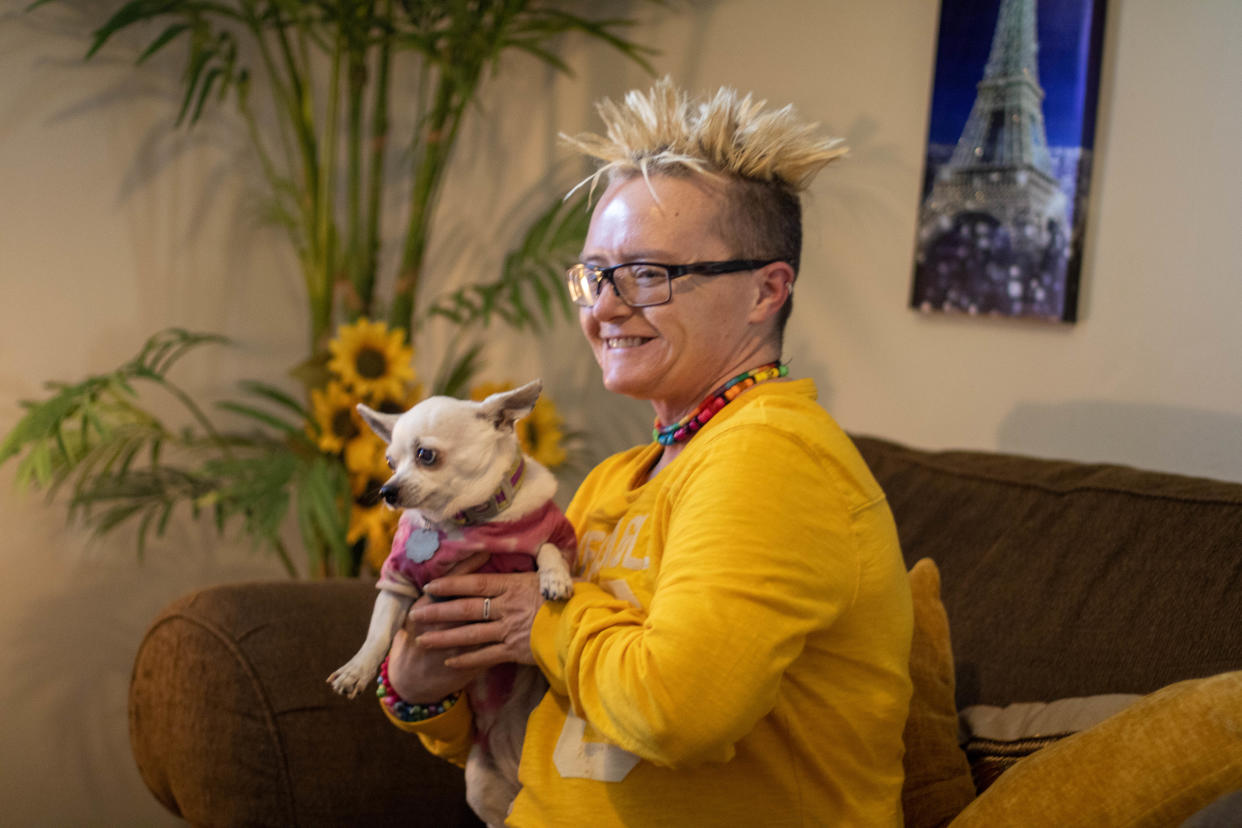
LAFAYETTE, Ind. — Every day they go about their lives unnoticed by society.
The stories that lead them to this point normally go unheard, and as Shakespeare once wrote, “When beggars die, there are no comets seen; The heavens themselves blaze forth the death of princes.”
Adam Brickey-Clemons, Virginia Brower, Anthony Brummett, Matthew Chambers, Thomas Coffey, Edward Conley, Matthew Creasy, Daniel Creech, Percy Lee Driver, Leonard Harvey, Fred Howard, Robert James, Steve Madary, Doug Mangus, Matthew Margison, Jimmy Miller, Michael Morrison, Michael Perrine, Michael Vessels, Rodney Ward and Jeffrey Wessell.
All died this year.
They were all homeless in Lafayette.
The city of Lafayette and the Lafayette Transitional Housing Center (LTHC) Homeless Services held a vigil Tuesday for those who had passed. Dec. 21 was National Homeless Persons’ Memorial Day.
Dec. 21, the winter solstice, marked the first day of winter and longest night of the year.
In honor of those who have died homeless, one story echoes of hopefulness, of one who made it back through the societal crack she once fell through.
Dawn's story
Dawn Baldwin is a bubbly person, considering the life she has lived. The kind of person who would greet you with an infectious smile as she firmly grabs your hand for a handshake and ask you how you’ve been, almost in a similar tone an old friend would offer.
By her smile alone, you wouldn’t have guessed that she had spent almost a decade on the streets, constantly panhandling folks or befriending strangers just so she could drink the night away.
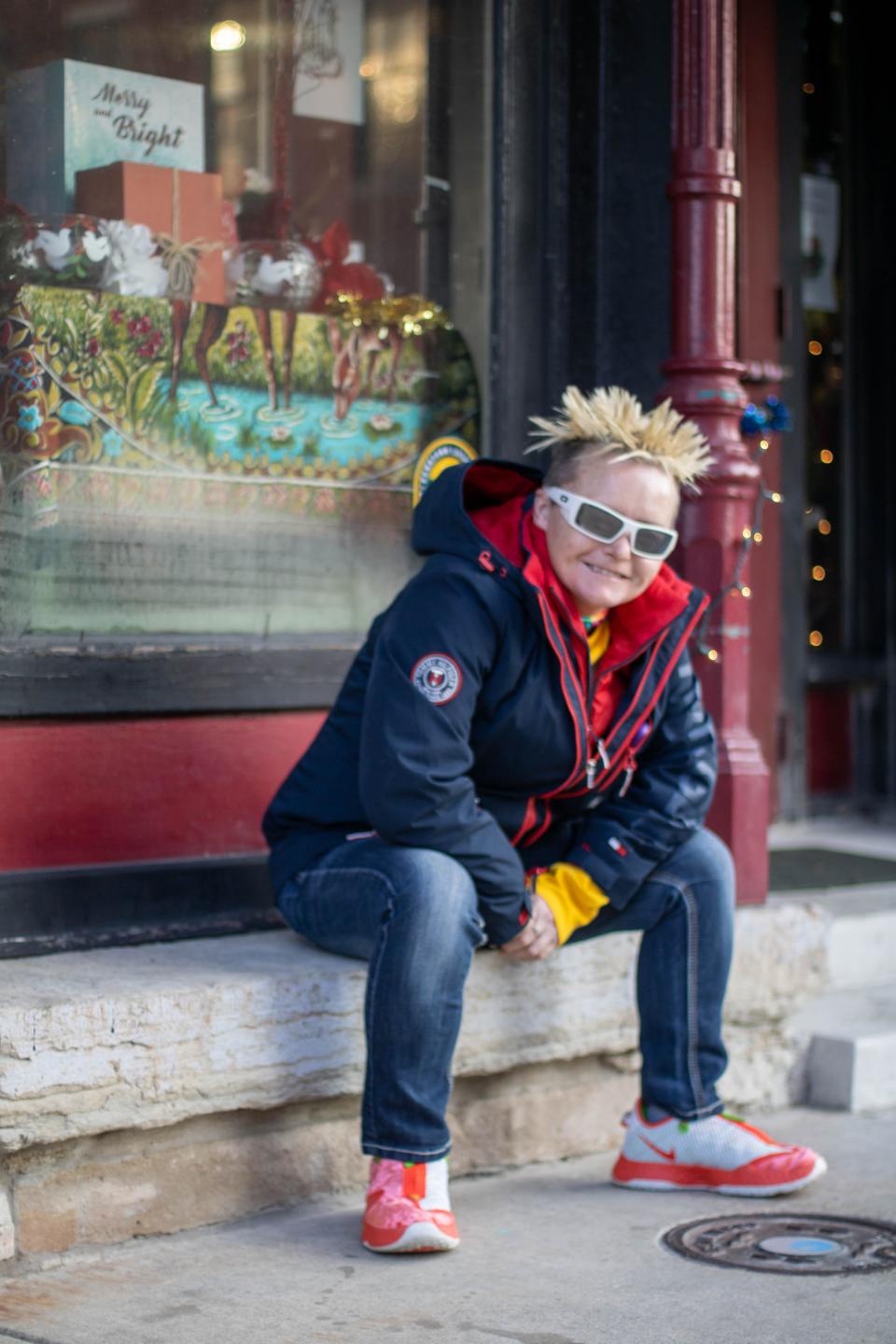
She didn’t drink for pleasure. She drank to silence the voices in her head that made it almost impossible for her to walk down the street without thinking someone was out to get her.
For years she used alcohol as a medicine to cope with her schizophrenia, although it wasn’t always like this.
Prior to living on the streets and dealing with her schizophrenia, Baldwin was already the survivor of another tragedy. Her mother died while Baldwin was still a child.
Eventually, she found refuge with a foster family. Although Baldwin was safe now, she wanted nothing to do with her hometown of Crawfordsville. She dedicated her time in high school to get into a college and got accepted into Purdue University.
At 21 years old, she graduated from Purdue with a degree in aeronautical and astronautical engineering, which eventually landed her a well-paying job at Boeing Co. in Dallas, Texas.
At this point in her life, Baldwin genuinely believed that the hardships from her past were behind her and that life would only treat her well from this point forward.
Which it did, for eight more years. Everything changed when one day Baldwin’s aunt and cousins asked if they could move into her spare condo.
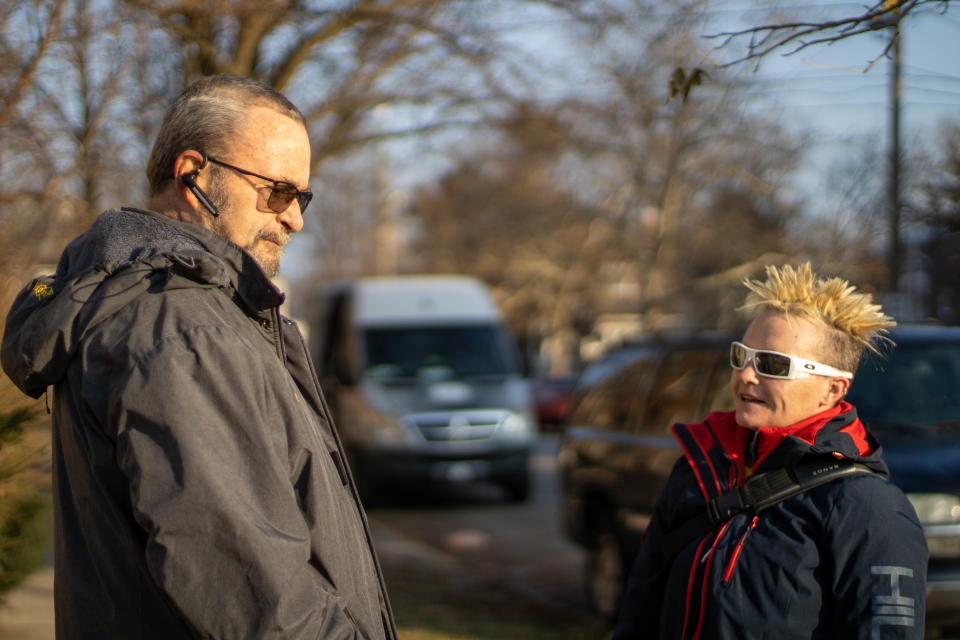
Baldwin, being the kind-hearted person she was, agreed and welcomed them in. She made breakfast for them every morning and made their beds once she got home from work.
Those plates of breakfast were never eaten, and those beds were never used. Her aunt and cousins didn’t exist.
At 29 years old, Baldwin’s schizophrenia began to emerge, and by the time she realized it, it was too late.
“I was out of reality. One day when I was at work the computers started to talk to me, and they weren’t meant to talk. The screens started moving on me and I had no idea why! I was in charge of making really high-level decisions that could bury the company, so I resigned because I knew it was dangerous,” said Baldwin.
After resigning from her position, Baldwin sought out medical care to try and figure out what was going on, but unfortunately, her primary care physicians were unable to diagnose her developing schizophrenia. Her condition continued to get worse, until one day she had a mental breakdown.
The spiral of tragedy would soon follow her.
“I had a psychotic break, where this one day which seems like a lifetime, everything changed. It all felt so real. Trees were talking to me; people were there that weren’t there. That day, I had the Dallas SWAT team out there, it was so bad. I saw wires being pulled through my walls and I saw Army men setting up tripwires. They had already been to my house twice and when I was telling them about the tripwires, the SWAT team and helicopters came. In Dallas, Texas, that’s how bad it was,” said Baldwin.
“I ran into my place, grabbed a butcher’s knife and a carving knife, was screaming, 'Help me! Help me! Help me!' I was swinging out trying to get to them. Police came and they handcuffed me ... I was very fortunate that the police realized that there was something wrong and not right. They took me to the hospital, where I got evaluated and the state locked me up in the psych ward.”
Hours before her breakdown, she had planned to meet with her old boss at Boeing to discuss her future with the company. When she first resigned from the company, they offered a yearlong severance package, which came with full medical coverage and her 401K left in tact. Because of her breakdown, any hope she had to return to that life was all gone in an instant.
“This is where my story of homelessness starts.”
While Baldwin was housed at the state psychiatric ward, her father found out. He drove down from Indiana and convinced the doctors at the ward to release her into his custody. At this time, she was in a state of psychosis and genuinely had no idea of what was happening around her.
After months of rummaging through the labyrinth that was her own mind, she finally woke up. She was lying on an old couch. For some reason, the place felt familiar, but not in a good way.
She had ended up back in Lafayette.
A new life in an old city
At first, she believed it to be another wrong turn in the maze in her mind, but the reality of the situation began to materialize when she saw her father.
“I’m here for weeks and don’t know that I’m here. When I come to, I’m in his little one-bedroom apartment sleeping on the couch with my two dogs and a bag of clothes … I still had money at this point, and I was going to look for a place to stay but I ended up back in the hospital.”
And over the next few months, she jumped back and forth between psychiatric wards and the hospital. Slowly this constant treatment ate away at the 401K she had saved with Boeing. She was desperately trying to return to a sense of normalcy to the point that money was no longer her priority. Her mental health was the priority.
She knew if she could conquer her mental illness, she’d be able to pull her life back together.
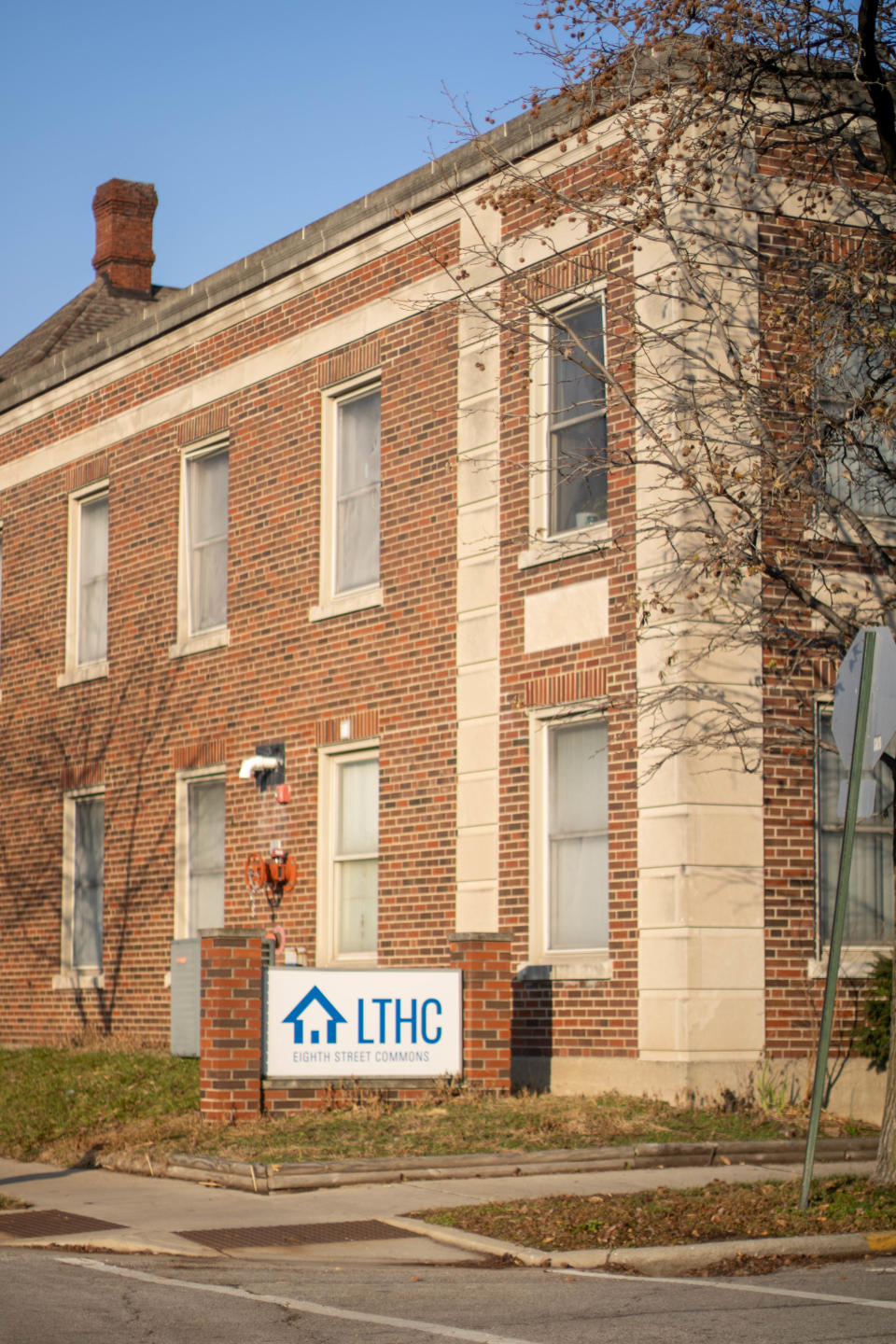
But she ran out of money.
She couldn’t afford to see a doctor anymore, and she couldn’t even afford the medicine that kept the voice at bay.
And as her bottle of pills began to run dry, the voices that taunted her every night began to grow louder and louder.
The bogeyman that haunted her at night was no longer afraid of the sun and thus began to haunt her every moment of her life.
She soon found a different bottle that could keep him at bay, the liquor bottles on the bottom of the shelf.
Because to her, being drunk was easy. Being crazy was harder.
Thus began her daily ritual of walking to the LTHC homeless shelter for her daily meals, sitting at Riehle Plaza to people watch and chat with strangers, drinking with her buddies, and then walking back to the shelter to sleep, hoping that tomorrow might be different.
“Honestly. The shelter was depressing. There was no hope,” said Baldwin.
Over the next few years, Baldwin tried to better her life. She’d stay with a few friends from her time in Purdue. Eventually, every place she stayed, she left. Baldwin felt like a burden on many of her friends. She had a roof over her head, but she was still mentally unwell.
One time she was able to secure a job bagging groceries, but there was one major issue, she couldn’t be drunk while at work. She completely understood and arrived to work early every day and sober. Although she was sober, her schizophrenia made it impossible to function as a worker.
One moment she’d be bagging groceries, the next she’d be in a random aisle trying to stock the shelves. Throughout her entire shift, she’d be doing something other than what she was asked to do.
Although the managers would understand her situation, they all eventually fired her.
She found herself teetering and tottering between success and failure, from being housed to being homeless.
After each failure, Baldwin considered giving up – “from six figures to homeless,” that was the mantra she’d tell herself every time.
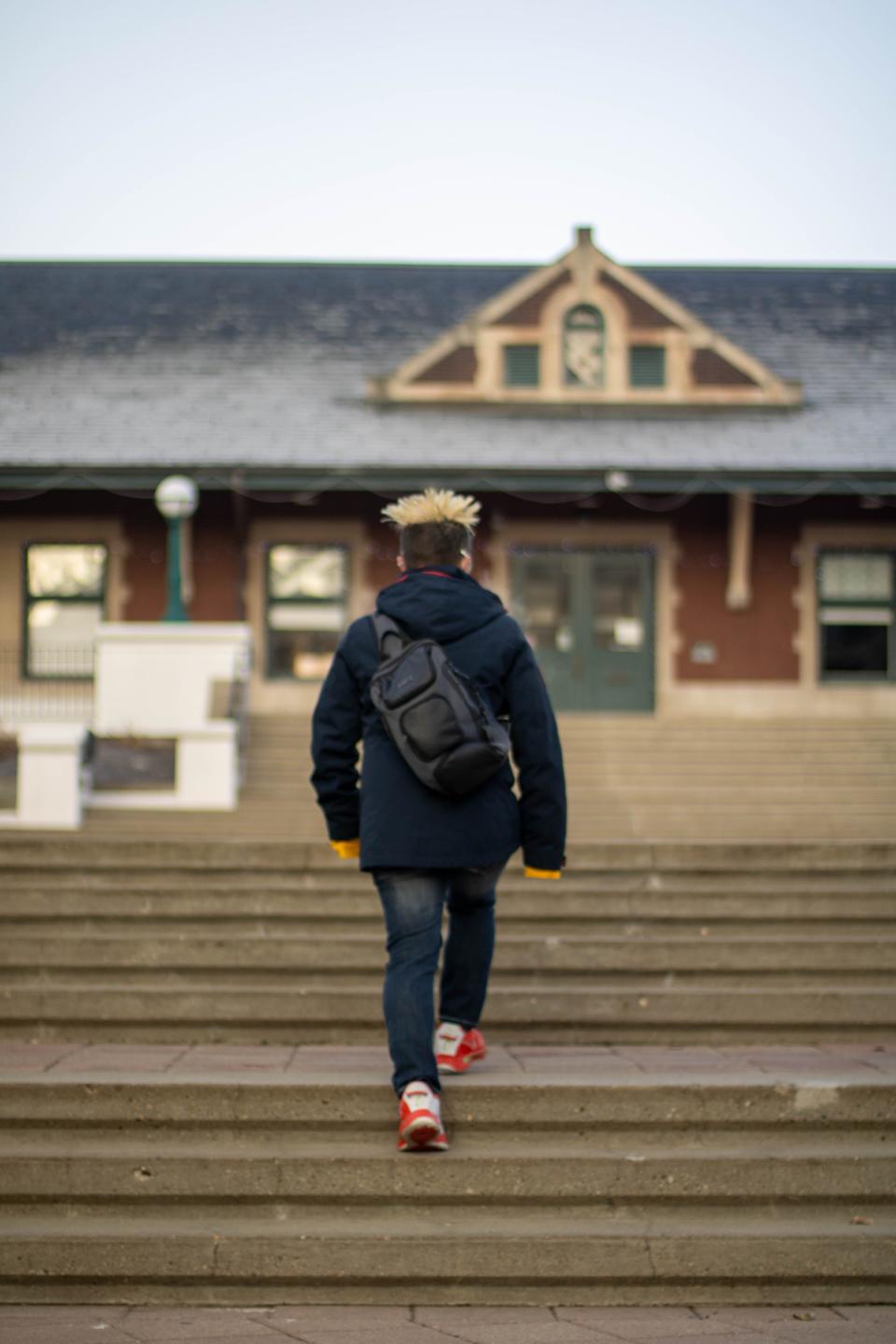
One day she found Sycamore Springs, a place where she was able to find the mental health service she was in desperate need of ages ago.
“I had to detox safely because that’s very dangerous at the level that I was drinking, to just stop. So, I wanted to go into this long-term program at Sycamore Springs. While I was there, I detoxed off the medicine I was taking and from alcohol. I got s*** face drunk one last time, went in there and safely detoxed, and I haven’t touched a bottle since,” said Baldwin.
Once she had finally finished her detoxing, Baldwin began to receive services to address her schizophrenia with a therapist. Slowly she learned how to cope with her illness, through taking the correct medication and proper self-awareness techniques.
During this time, Baldwin was also accepted into the LTHC’s Homeless Services Program, which offers the steps one needs to find a permanent housing solution, through employment opportunities and with help from a case manager, explained Jennifer Shook, LTHC’s chief development officer.
All Baldwin had to do now was continue her treatment at Sycamore Springs and to follow the rules given to her by the LTHC Homeless Services Program.
Because of one mistake, she almost lost that opportunity, too.
One day Baldwin was hanging out with a friend in his room at the LTHC Eighth Street Commons. Both of them lived within these commons but on separate sides of the building.
That night Baldwin accidentally fell asleep in her friend’s room. She didn’t think much of it at the time, but her case manager, Bill Miller, thought otherwise. When he discovered what had happened, Miller issued an ultimatum, either follow the rules of the commons or leave.
This was like cold water to the face, what she needed to finally get herself out of this situation.
“It was a wake-up call! I was like, am I really going to end up back on the street for something as stupid as falling asleep in someone else's room? No. I’m getting out of this.”
On her own, at a place she cherishes
After one year of constant treatment and hard work, Baldwin eventually left the commons, and now lives in a small apartment on Fourth street. The LTHC supported her through this process via their Permanent Supportive Housing, where individuals sign a one-year lease and are offered a rental subsidy through the Lafayette Housing Authority.
Baldwin now has a stable job and a small apartment she cherishes.
You may see her occasionally walking through the streets of downtown. She’s pretty noticeable with her spiky blond hair and infectious smile.
Baldwin plans to run for a board member seat at the LTHC, because now that she’s been through the system, she believes she can help those who are teetering and tottering, just like she was.
If interested in donating to LTHC, the nonprofit needs winter clothes or a monetary contribution. You can also visit their website at lthc.net.
Noe Padilla is a reporter for the Journal & Courier. Email him at Npadilla@jconline.com and follow him on Twitter at 1NoePadilla.
This article originally appeared on Lafayette Journal & Courier: One Lafayette woman's story of 'six figures to homeless'

